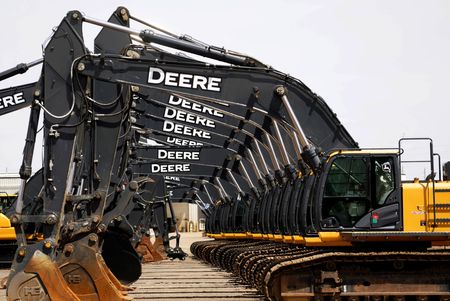 1
1 1
1

By Bianca Flowers and Aishwarya Nair
(Reuters) -Deere & Co on Friday missed Wall Street revenue targets and said it was having difficulty securing parts for its heavy machinery, sending shares down 14%.
Deere gave a strong profit forecast for the full year that was overshadowed by comments that many of the machines it intended to sell were on hold because of supply-chain issues.
The company had only missed sales expectations once in the previous 10 quarters. It was expected the agricultural equipment maker would post net sales of $13.2 billion, but revenue came in at $12.02 billion.
Although the machinery giant has weathered the storm of supply-chain bottlenecks, revenue nearly 9% below analysts consensus suggest that raw material shortages, compounded by inflationary pressures, are starting to take their toll.
“I do think the Street was thinking this could happen because expectations were elevated, quite frankly,” said Stephen Volkmann, senior machinery analyst at Jefferies. “Their guidance for the full year tells you that they think things are going to improve.”
Shares fell 14%, trading at $311.84.
Company executives told analysts on a conference call that supply chain snafus will last through the year.
“Given the strong fundamentals in agriculture, coupled with the underlying supply constraints, we do not see the industry being able to meet all of the demand that exists in 2022,” said Ryan Campbell, chief financial officer.
Deere’s net income was $2.09 billion or $6.81 per share for the quarter ended May 1, slightly beating the Refinitiv-IBES consensus estimate of $6.71 per share.
Prior to earnings, the manufacturer’s stock performance has largely outpaced the general market, unlike other industrials where supply constraints have been a consistent pain point for top-line growth.
The company continues to be bullish on its suite of precision ag technologies with sales up 13% year-over year, yet revenue still fell below analysts expectations.
Higher input costs have pinched farmers’ profits, but net income for farmers remains relatively strong, which is a bright spot for equipment sales. Sentiment for tractors and small ag sales is positive, and company executives believe aging machinery will encourage farmers to upgrade their fleet.
“They’ve navigated the pandemic and post-pandemic supply chain pretty well up until this point,” said Jerry Revich, an analyst at Goldman Sachs. “The fact that they have over a billion dollars of inventory in-house does suggest they have some level of visibility on ramping up production, so we’ll see if they can execute.”
(Reporting by Aishwarya Nair in Bengaluru; Editing by Krishna Chandra Eluri, Alexander Smith and Nick Zieminski)